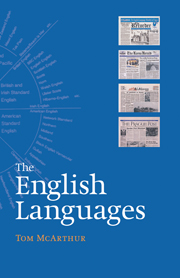2 - A universal resource
Published online by Cambridge University Press: 12 October 2018
Summary
1933
English… B. sb. 1. The English language. Also attrib., as E. scholar. OE…
(definition, William Little et al (eds.), The Shorter Oxford English Dictionary on Historical Prindples)1993
English… Bn. 1 Orig., the language spoken by the Germanic invaders of Britain in the 5th cent. AD. Now, the language descended from this, used in Britain, Ireland, Australia, New Zealand, the US, and many other countries. OE…
(definition, Lesley Brown (ed.), The New Shorter Oxford Dictionary on Historical Prindples)Bilingual within a language? - The scale and scope of English
For good or ill, at the end of the second millennium AD and the fifth füll millennium since recorded history began, English is unique. No language has ever before been put to so many uses so massively by so many people in so many places - on every continent and in every sea; in the air and in space; in thought, Speech, and writing; in print on paper and screen; in sound on tape and film; by radio, television, and telephone; and via electronic networks and multimedia. It is also used as mother tongue or other tongue - fluently, adequately, or haltingly; constantly, intermittently, or seldom; happily, unhappily, or ambivalently - by over a billion people. Perhaps a fifth of the human race. Frangois Chevillet, Professor of English at Universite Stendhal in Grenoble, France, has described the Situation as follows:
Depuis le milieu du XIXe siede, le röle de Tanglais n'a fait que croitre. Le declin de l'empire britannique n'a pas entraine le recul de la langue (cf. le sort du frangais), bien au contraire. L'anglais n'est pas une langue internationale, ä l'instar de Fespagnol ou du russe, mais c'est une langue mondiale, en raison de la puissance economique et culturelle du monde anglo-saxon (Etats-Unis) et du röle croissant des medias.
(Histoire de la langue anglaise, Paris: Presses universitaires de France, 1994, p. 118.)[My translation: Since the middle of the nineteenth Century, the role of English has done nothing but grow. The decline of the British Empire has not entailed a corresponding decline in the language (compare the fate of French) - quite the contrary. English is not an international language, after the fashion of Spanish or Russian, but a world language, a consequence of the economic and cultural strength of the Anglo-Saxon world (the United States) and the increasing role of the media.]
- Type
- Chapter
- Information
- The English Languages , pp. 30 - 55Publisher: Cambridge University PressPrint publication year: 1998



